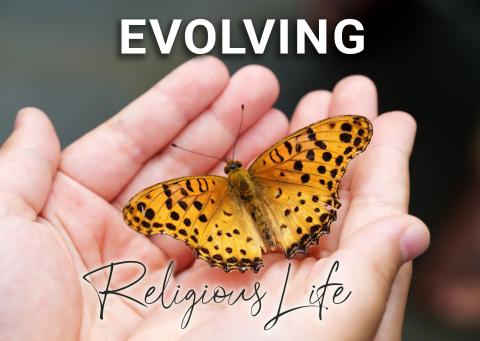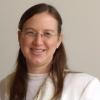![[At La Rosa Rehabilitation Center] we embrace Christ's mission to accompany those who feel enslaved by their bonds, not only physically by a substance, but also by the burdens and wounds that weigh them down. (Unsplash/Pascal van de Vendel)](/files/2024-03/pascal-van-de-vendel-RqjNWnQbWGU-unsplash.jpg)
[At La Rosa Rehabilitation Center] we embrace Christ's mission to accompany those who feel enslaved by their bonds, not only physically by a substance, but also by the burdens and wounds that weigh them down. (Unsplash/Pascal van de Vendel)
Editor's note: Evolving Religious Life, a new series from Global Sisters Report, explores how Catholic sisters are adapting to the realities of congregations in transition and new forms of religious life. While we often write about these trends, this particular series will focus more closely on sisters' hopes for the future.

I envision my calling as a path along where God led me by the hand, step by step, with tenderness and patience. I was born into a Mexican family that was Catholic by tradition but with very little formation in the faith. I remember going to Mass only a few times when I was little, and when I did, I didn't understand anything that was happening, but I liked the songs.
When I was 14-years-old, Jesus called me to a first encounter with him during a retreat for teenagers that profoundly impacted my life. It was then that I felt God's gaze upon me for the first time. After that retreat, I joined a parish group and gladly attended every Saturday.
I heard the words "vocation" and "consecration" for the first time during a talk I was invited to attend. It was there that a fire was lit in my heart, and a restlessness began to arise within me.
It was not long before I was about to start college, and I was afraid that if I started, I would enjoy it and want to finish, and then God would not call me back.
I went through the vocational process of the archdiocese, a journey of faith that lasted a school year and coincided with my final year of high school. This process allowed me to clarify my call to consecrate myself to him. I was accompanied by a Salesian Sister who helped me and listened to me with love and patience. It was also very comforting to meet other young women who shared the same doubts and concerns, allowing us to discuss and support each other.
I met several congregations, but I didn't feel that I completely fit in with any of them. At the end of the process, one congregation caught my attention because of its spirituality, and I requested a live-in experience to get to know them better.
However, that summer, the sisters of that congregation could not receive me; I had to wait two or three months to begin a discernment process with them. This wait was very disappointing for me, as I felt I could not wait that long. It was not long before I was about to start college, and I was afraid that if I started, I would enjoy it and want to finish, and then God would not call me back. Anxiety took over my heart and I gave up my search, finishing the vocational process still in crisis and undecided.
I've experienced various processes of human and spiritual growth, and I continue to find liberation in following God.
Marifer Icaza (second from right), of the Eliya Community, is a sociologist with a degree in Anthropology and certified in Addictions Counseling offering comprehensive counseling at the La Rosa Rehabilitation Center in Mexico (Marifer Icaza)
Fortunately, God did not stop looking for me. Just a week before starting my studies, I attended a retreat where the community to which I currently belong was present. As I listened to them, I felt a great restlessness. I was struck by the joy and faith they projected. During a Holy Hour, something different happened in me, something that could not go unnoticed. I experienced a force that attracted me enormously to God, while my mind was racing, struggling with what to do. I surrendered and sensed that Jesus had taken me by the hand just for that moment, and I knew I needed to take the risk despite my fear.
I began my formation without knowing much about the various types of consecrated life, but gradually we acquainted ourselves and delved deeper into our way of life as a secular institute.
A secular institute is a form of consecrated life in which the faithful aspire to the perfection of charity and dedicate themselves to procure the sanctification of the world, especially from within it (Code of Canon Law 710). They profess vows of chastity, poverty and obedience. Given the circumstances and needs of the church and the world, there are many varied forms of secular institutes. Some members live alone or with their families, while others, like us, lead a common life. Some institutes have works proper to the apostolate, while others do not, depending on their statutes.
We firmly believe that a personal encounter with Jesus during this process is essential for them to make decisions freely and lead their lives in fullness.
The members of secular institutes manifest and exercise their consecration through apostolic activity. Like leaven, we strive to permeate the realities we live in with an evangelical spirit, for the strength and growth of the body of Christ.
The Eliya Community was founded in 1981 in the city of Durango, Mexico, with the purpose of bringing faith to young people struggling with addiction. Our founder, a layman named Rodolfo Ortiz (†), had personally struggled with addiction. God provided the means for him to convert and start prayer and praise groups where young people and their families could receive the word. Additionally, a gymnasium was established to help keep them away from vices and provide a healthier environment.
Later, once settled in the city of Monterrey, Mexico, it became clear that there was a need to attend to the young people in a professional manner. Some of the brothers then decided to go to Tijuana, Mexico, to train with the Good Shepherd Brothers, who run a rehabilitation center. There, the brothers learned a lot about addiction. In 1998, the La Rosa Rehabilitation Center was established, offering users an integral treatment that addresses physical health through detoxification with a natural method, as well as social, family, psychological and spiritual areas.
Advertisement
Our charism as an institute is freedom, rooted in the paschal mystery of Christ who, by his passion, death and Resurrection, has freed us from slavery and death. Our motto is based on Luke 4:16: "The Spirit of the Lord is upon me, because he has anointed me. He has sent me to bring good news to the poor, to proclaim liberty to the captives and recovery of sight to the blind, to set at liberty those who are oppressed, to proclaim the year of the Lord's favor."
We embrace Christ's mission to accompany those who feel enslaved by their bonds, not only physically by a substance, but also by the burdens and wounds that weigh them down.
Another way in which God guides us is through the spiritual exercises of St. Ignatius, which we integrate into our daily life and share with both young people and adults. As a community, we've discovered great richness in this spirituality, personally experiencing its liberating power. We are committed to continuing to spread the love of God surrounding us. In addition, we actively engage with the vocational center of the archdiocese, guiding young people as they discern their vocation. We firmly believe that a personal encounter with Jesus during this process is essential for them to make decisions freely and lead their lives in fullness.
The mission of being a companion is something I've gradually discovered and embraced throughout my journey. I've experienced various processes of human and spiritual growth, and I continue to find liberation in following God. Confronting my limitations, I've come to realize that God's mercy alone has sustained me all this time. Along the way, I have been accompanied by several people whose love, patience, listening and understanding have helped me to understand the God of Jesus, gradually dispelling the images of the God I once held. It is not a simple process, but it's essential for learning to walk with greater freedom.
As I journey through valleys and deserts, I come to understand that his strength surpasses mine, his hope outweighs my disappointments and his abundance exceeds my poverty. In a sense, we become what we choose, and I have chosen true love and I have no regrets!





